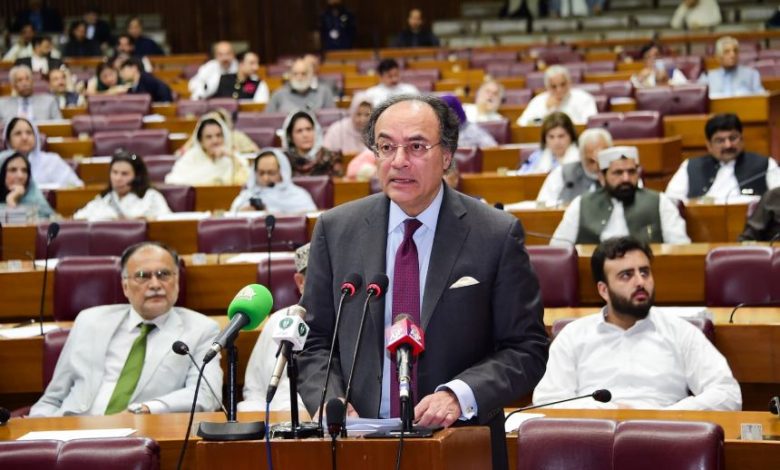CPEC: Pakistan’s Finance Minister to Arrive in China to Discuss Rescheduling of a $15 billion Energy Loan

- Pakistan’s Finance Minister to Arrive in China to Discuss the Rescheduling of a $15 billion Energy Loan
- Discussions with Chinese authorities to focus on addressing concerns related to China’s energy circular debt, and collaborative projects under CPEC
- China has raised the issue of the repayment of their Rs523 billion dues on account of electricity purchases: Ahsan Iqbal
- Pakistan to ask Chinese power plants operators to shift to using coal from Thar region rather than imported coal: Minister for Energy
- Power production contracts signed (IPPs) are “exploitative agreements”: Former minister
- Pakistan plans to seek investment, for “bankable and investable” projects from China: Finance Minister
By: Muhammad Arif, Editor NSN.Asia
Islamabad: Pakistan’s Federal Finance Minister, Mohammad Aurangzeb, will land in China today (Wednesday) on a three-day visit having agenda to negotiate the rescheduling or repayment of a $15 billion energy loan with Chinese authorities who have invested $28 billion in energy and infrastructure projects in Pakistan since the launch of CPEC in 2013.
The visit comes at a time when Pakistan is facing the crippling economic and financial crisis caused by reimbursement of financial loans, and heavy electricity prices that have prompted the poor and middle-class of Pakistan to grapple with rising inflation.
Agenda 1: rescheduling of $15.4 billion debt
The top agenda item for discussions with Chinese authorities will be rescheduling of $15.4 billion debt of Chinese independent power producers’ (IPPs) who will be asked to extend the tenure of the loan amount by five years, from 2036 to 2041.
Earlier in 2024, China rolled over a $2 billion loan to Pakistan.
“China has raised the issue of the repayment of their Rs523 billion dues on account of electricity purchases, but the country can only make these payments when the economic situation improves”, said Pakistan’s Minister for Planning Ahsan after attending the 13th Joint Cooperation Committee (JCC) meeting, the highest decision-making body of the CPEC.
The minister further added by saying “China has agreed to study a proposal to convert imported-coal projects to local coal for coal-based power generation. This move would save $1 billion per annum in coal costs and facilitate timely payments to Chinese energy suppliers”.
At the home front, the ruling government is facing the mounting pressure as high costs of electricity have weakened the industry, businesses and the common people.
“Pakistan will ask Chinese power plants operators in the country to shift to using coal from Thar region rather than imported coal,” Federal Minister for Energy (Power Division) Awais Leghari told Reuters on Sunday.
Minister further added by saying the “move will also reduce pressure on foreign exchange reserves, and claimed transition to local coal may save Pakistan over Rs200bn/year in imports”.
“If Chinese IPPs move from imported to domestic coal, electricity tariff may decrease by Rs2.5 per unit,” said Leghari.
Commenting on high costs of electricity, former Caretaker Federal Minister Gohar Ejaz termed power production contracts signed with Independent Power Producers (IPPs) as “exploitative agreements” that have the exorbitant costs inflicted on the nation due to these contracts.
The government has paid a staggering 1.95 trillion rupees to the most expensive IPPs, he revealed.
Agenda 2: Seeking funding from China for development projects
During the visit to China, the finance minister’s discussions will also cover the ongoing efforts of Pakistani government regarding the developments on CPEC and other collaborative projects.
Talks will include seeking $17b funding from China for nine key projects of electricity generation projects, and infrastructure schemes to expand CPEC, a flagship project of Belt and Road initiative.
Talking to Reuters, Finance Minister said Pakistan plans to seek investment, for “bankable and investable” projects from China, Saudi Arabia and the United Arab Emirates.
Pakistan plans to expand its strategy beyond relying heavily on rollovers and toward foreign direct investment, including in the huge copper and gold Reko Diq mine in southern Pakistan, he added.
Also, Islamabad will discuss power sector structural reforms with Beijing that have been suggested by the IMF. Beijing has set up over $20 billion worth of planned energy projects in Pakistan, minister told.
The finance minister will hold talks regarding the Panda Bond, as Pakistan seeks to secure $30 million through this financial instrument in China.
A joint working group is like to be established between Pakistan and China to facilitate the loan rescheduling, according to sources from the Ministry of Finance.
Rescheduling or disbursements on loans from Pakistan’s long-time allies China, Saudi Arabia, and UAE have helped Pakistan meet its external financing needs in the past.





